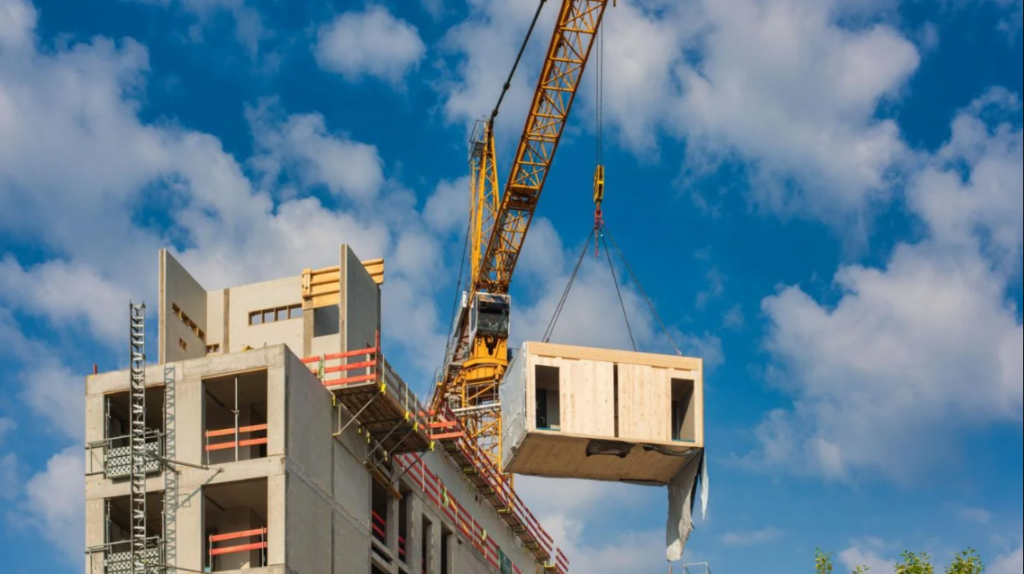
The construction industry plays a vital role in shaping our communities. As global trends shift toward technology, sustainability, and innovation, The Future of the Construction Industry looks promising. With the increasing demand for eco-friendly designs and high-tech solutions, the industry will undergo major transformations. New materials, construction methods, and technologies will change how buildings are designed and constructed, creating smarter and more sustainable spaces for future generations.
1. Green Construction, Sustainability at the Core: The Future of the Construction Industry

Sustainability is a top priority in today’s construction industry. Environmental concerns have pushed companies to adopt green building practices, reducing their impact on the planet. Green buildings use energy-efficient designs, eco-friendly materials, and renewable energy sources to minimize carbon footprints. We can expect to see more buildings certified by green standards like LEED in the future. These initiatives will help reduce waste, improve air quality, and create healthier spaces for people to live and work.
Investing in sustainability offers long-term benefits. Green buildings not only conserve resources but also reduce operational costs. The shift towards sustainable construction will make buildings more energy-efficient and environmentally responsible, providing a better quality of life for occupants.
2. Smart Buildings, The Rise of Technology: The Future of the Construction Industry

Technology will increasingly shape the future of construction. Smart buildings, equipped with integrated systems, will automate everything from lighting to heating and cooling. As AI and IoT continue to develop, expect to see these technologies control energy use, optimize comfort, and reduce waste. For example, sensors will detect and adjust temperatures to maximize energy efficiency. With technology taking center stage, smart buildings will offer greater convenience and better performance.
Building owners and residents will enjoy lower utility bills thanks to these smart systems. Automation will also help building managers identify maintenance needs in real-time, extending the life of systems and reducing costly repairs.
3. Modular and Prefabricated Construction: The Future of the Construction Industry

Modular construction is becoming increasingly popular due to its efficiency and cost-effectiveness. This process involves constructing pre-fabricated sections of a building in a factory and assembling them on-site. With modular construction, the need for extensive labor and on-site building materials decreases, reducing construction times and waste. As this method gains momentum, the construction industry will see faster project completions and lower expenses.
The benefits of modular construction extend beyond residential buildings. Commercial buildings, schools, and hospitals can also benefit from this method. Prefabricated elements will allow construction projects to move more quickly and with greater precision, helping businesses meet tight deadlines.
4. 3D Printing in Construction: The Future of the Construction Industry
3D printing technology is revolutionizing the construction industry. Instead of traditional building methods, 3D printing uses digital designs to print building components layer by layer. This technology promises faster construction times, reduced material waste, and more customized designs. In the future, 3D printing could even allow entire houses to be built using locally sourced materials.
This innovative technology will not only make housing more affordable but also help areas affected by natural disasters. By quickly producing low-cost housing solutions, 3D printing can address the need for shelter in regions where traditional construction methods are impractical.
5. Robotics in Construction: The Future of the Construction Industry
Robots will play a major role in the future of construction. These machines will perform tasks such as bricklaying, demolition, and heavy lifting with greater efficiency and safety than human workers. With the ability to operate continuously, robots can handle repetitive tasks, reducing the potential for errors and increasing overall productivity.
In the coming years, construction workers will collaborate with robots, using them for tasks that require precision and efficiency. Autonomous vehicles, like cranes and bulldozers, will further improve operations, making construction sites safer and more efficient.
6. Virtual and Augmented Reality in Design: The Future of the Construction Industry
Virtual Reality (VR) and Augmented Reality (AR) are becoming essential tools for construction professionals. With VR, architects and clients can tour virtual models of buildings before construction begins. This allows for better planning, faster decision-making, and improved project outcomes. AR, which overlays digital information on the physical world, helps visualize designs in real time, ensuring that all stakeholders understand how changes will affect the final result.
These technologies will also help construction teams identify potential issues early, reducing delays and preventing costly mistakes. By improving collaboration and reducing the chances of error, VR and AR will make construction projects more efficient and less prone to rework.
7. The Rise of Autonomous Construction Equipment
Construction equipment is becoming smarter. Autonomous vehicles and machinery will operate without human intervention, using sensors and AI to perform tasks like digging, lifting, and transporting materials. These machines will work more efficiently, reducing labor costs and project timelines.
The use of autonomous equipment will improve safety by removing workers from dangerous tasks. With these machines working around the clock, construction projects will proceed faster and with fewer interruptions, leading to more efficient use of resources.
8. Advanced Building Materials
The future of construction will feature advanced building materials that offer superior durability, energy efficiency, and environmental benefits. One example is self-healing concrete, which can repair small cracks as they form. This innovative material will extend the lifespan of buildings, reducing the need for repairs. Transparent aluminum is another promising material that combines strength and transparency, offering new possibilities for windows and facades.
The construction industry will also adopt new insulation materials that improve energy efficiency and reduce heating and cooling costs. These advanced materials will help buildings become more sustainable and cost-effective in the long run.
9. Drones in Construction
Drones are transforming the way construction projects are managed. Equipped with cameras and sensors, drones can survey construction sites, inspect structures, and deliver materials to hard-to-reach locations. Drones will become an essential tool for project managers, providing real-time aerial data and improving efficiency.
By using drones, construction teams can track progress more easily, reducing the time spent on site inspections. With high-quality aerial imagery, project managers can make better decisions and keep projects on schedule.
10. Artificial Intelligence in Construction Project Management
Artificial Intelligence (AI) is reshaping how construction projects are managed. AI tools can analyze data to optimize schedules, budgets, and resources. By predicting potential delays or cost overruns, AI will help project managers make smarter decisions, ensuring projects stay on track. AI can also assist in risk management by identifying potential hazards before they become problems.
AI-powered tools will also streamline the hiring process, helping construction companies match workers with specific tasks. As a result, teams will operate more efficiently, and projects will be completed with fewer delays.
11. Internet of Things (IoT) in Building Maintenance
The Internet of Things (IoT) will revolutionize how buildings are maintained. Sensors embedded in buildings will monitor everything from energy use to structural health. These sensors will send real-time data to building managers, helping them identify issues early and address maintenance needs promptly.
IoT systems will enable predictive maintenance, reducing downtime and lowering costs. For example, sensors will detect issues with HVAC systems or plumbing, allowing repairs to be made before they turn into costly problems. This proactive approach will help building owners keep their properties in excellent condition.
12. Urban Planning and Smart Cities
Urban planning will become more sophisticated as cities embrace the concept of smart cities. These cities will integrate technology into their infrastructure, making them more efficient, sustainable, and connected. Smart cities will feature intelligent transportation systems, energy-efficient buildings, and digital services that improve the quality of life for residents.
Construction companies will play a key role in developing the infrastructure of smart cities. These cities will rely on smart construction practices to create sustainable buildings that contribute to a higher quality of life and lower environmental impact.
13. The Role of Sustainability in Architecture
Architects will continue to lead the charge in promoting sustainability in the construction industry. As demand for eco-friendly buildings increases, architects will design structures that use energy-efficient materials, maximize natural light, and reduce waste. The future will bring more buildings with green roofs, solar panels, and smart energy systems that help minimize their environmental footprint.
Green architecture will evolve as architects incorporate advanced technologies and materials that contribute to sustainability. By focusing on long-term environmental impact, architects will play a critical role in shaping the future of construction.
14. The Changing Workforce in Construction
The construction workforce will undergo significant changes in the coming years. A younger, more tech-savvy generation will enter the industry, bringing new skills and fresh ideas. As new technologies become more prevalent, workers will need training to handle advanced equipment, manage data, and collaborate across digital platforms.
The construction industry will need to invest in upskilling its workforce to ensure workers are prepared for the demands of the future. By fostering a more diverse and skilled workforce, companies will ensure that they remain competitive in an evolving industry.
15. The Future of Construction: A Collaborative Industry
The future of construction will be defined by collaboration. As technologies like AI, robotics, and smart systems become integrated into building projects, teamwork will be crucial. Construction teams, architects, engineers, and tech experts will need to work closely together to create innovative solutions.
Collaboration will drive efficiency, reduce errors, and create better buildings. By embracing teamwork and technological innovation, the construction industry will continue to thrive in an ever-changing world.